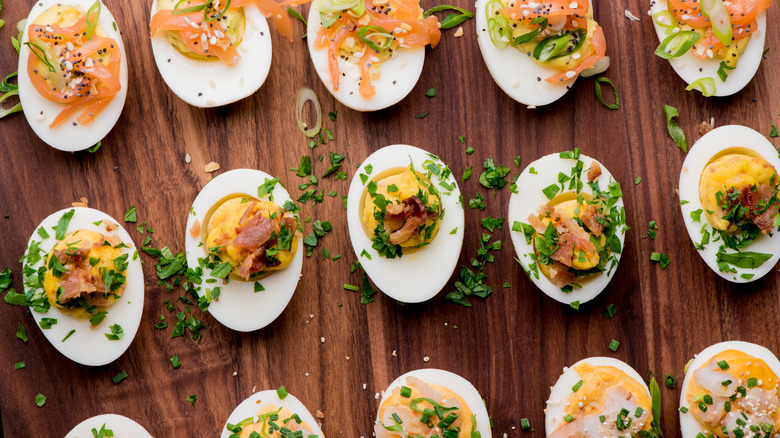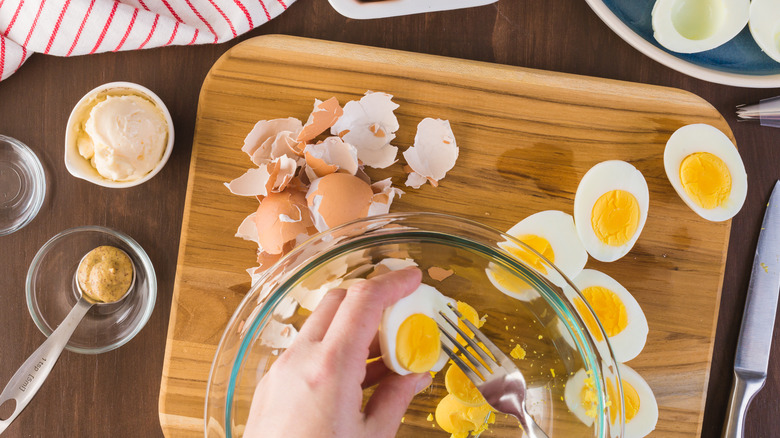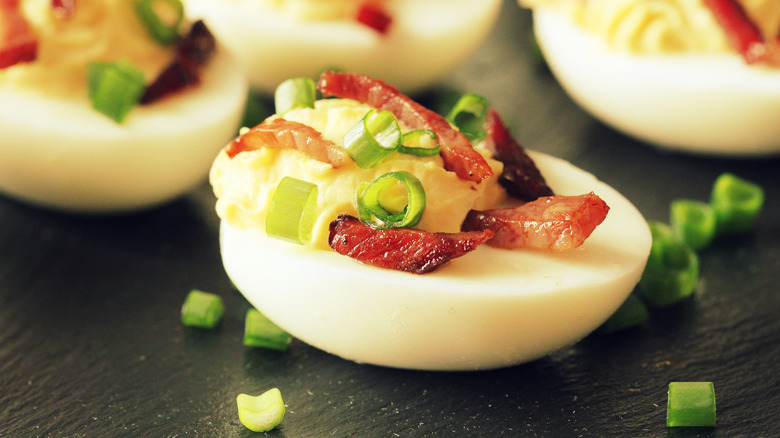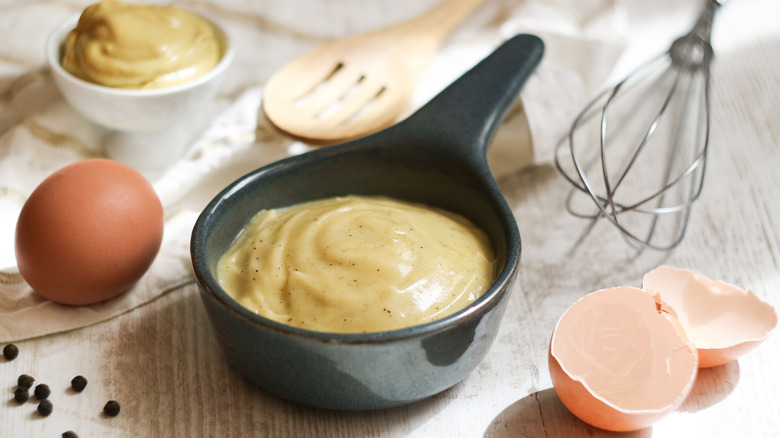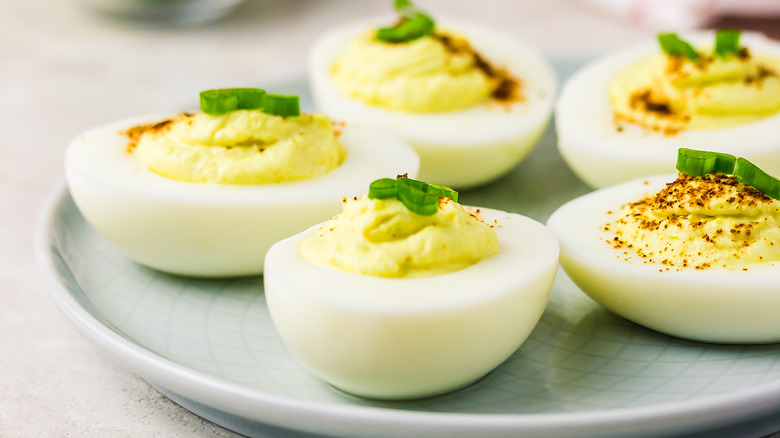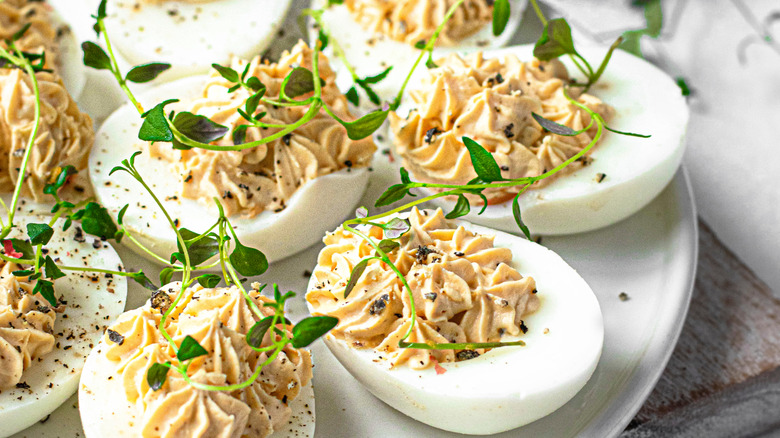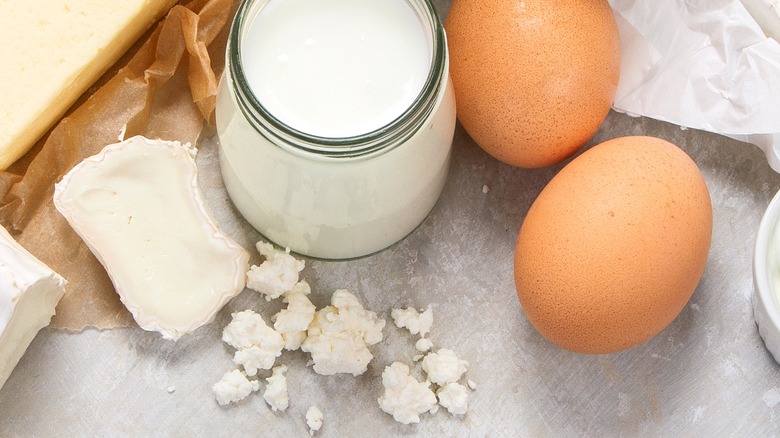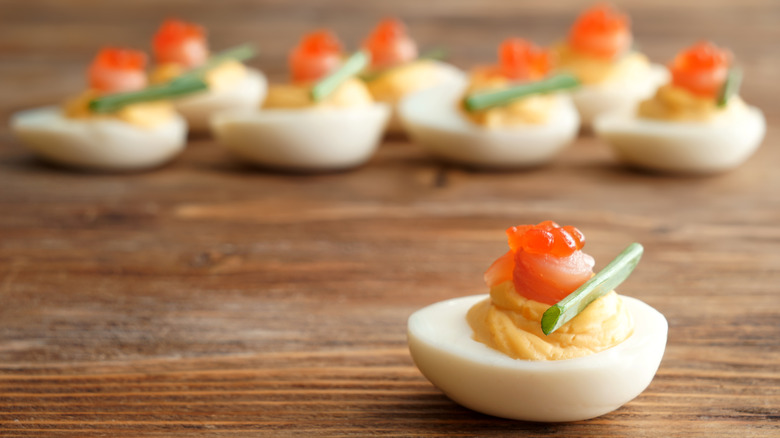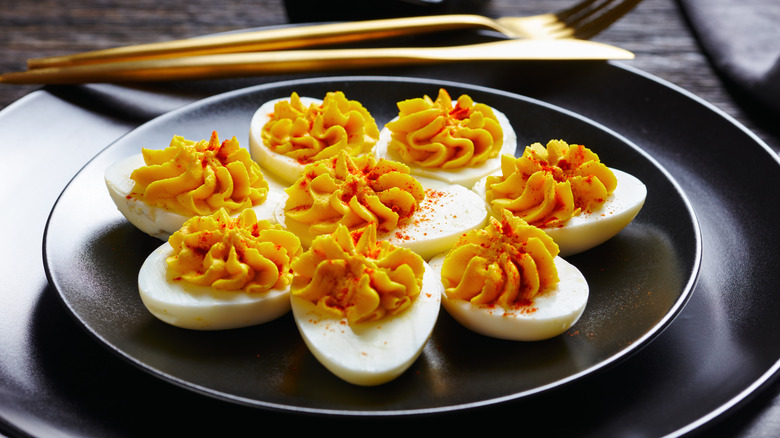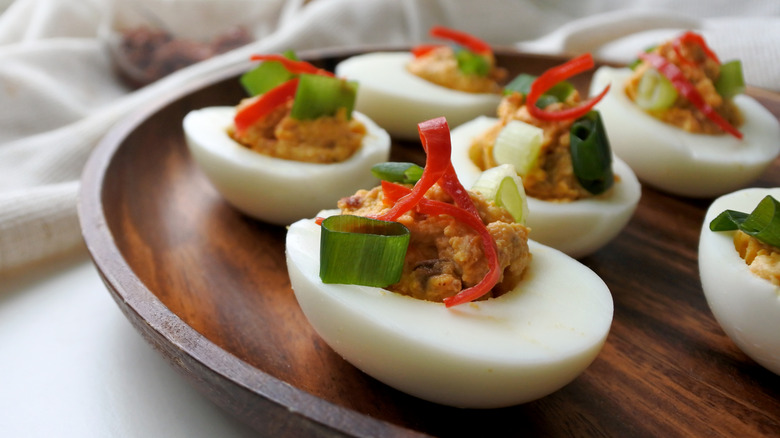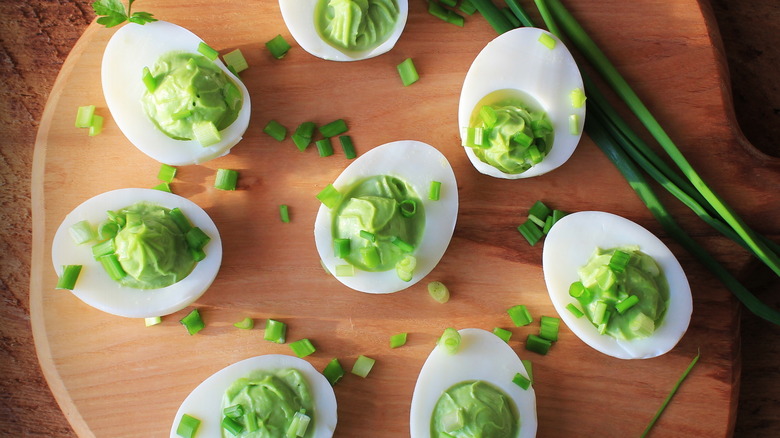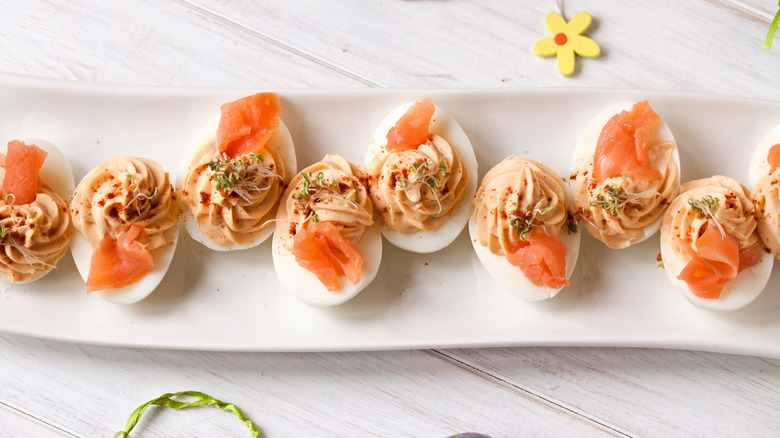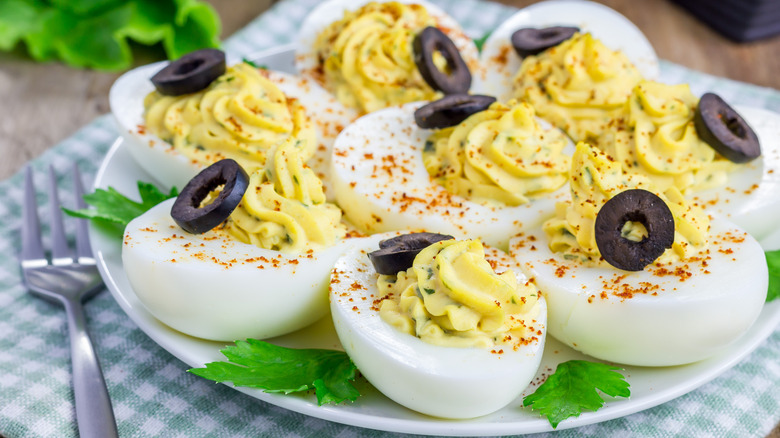12 Secret Ingredients That Will Take Your Deviled Eggs To The Next Level
Whether you're prepping appetizers for a party or holiday gathering, whipping up something fun and whimsical for a potluck, or just making some delectable snacks for a weekend TV binge, deviled eggs are the perfect option. They're relatively easy to prepare, inexpensive—and best of all—everybody loves them!
While the process of boiling eggs and flavoring them with a variety of spices dates back to the dawn of human history, the dish we know today as "deviled eggs" originated in the late 18th and early 19th century when the act of "deviling" food (or preparing a dish potent and fiery spices or condiments) first gained mainstream popularity.
The basic recipe for deviled eggs has remained fairly simple. After eggs have been hard-boiled, peeled, and cut in half, the yolks are removed and mashed together with a mixture of mayonnaise, mustard, vinegar, and salt and pepper. That filling is then scooped or piped back into the hollowed-out egg whites—and voilà, instant deviled eggs!
Although there are a number of wonderful things about the standard recipe for deviled eggs—its simplicity or the fact that you can easily adjust ingredients to taste—the true beauty of deviled eggs is that you can modify the dish in countless ways to put your own unique spin on it. Looking for inspiration to get you started? Read on from tons of ideas for how you can make the deviled eggs you love even more delicious!
Add butter to your egg yolks
Celebrity chefs ranging from Martha Stewart to Julia Child have cited butter as one of the "secret" ingredients needed to make deviled eggs with a luscious, super creamy filling that stays firm—and not watery—at room temperature.
With its rich, salty, and indulgent fatty flavor, butter is the perfect unexpected addition to add to any batch of deviled eggs. And because it's made by churning cream until it has solidified, butter also adds a bit of inherent firmness and texture to deviled egg filling, preventing it from starting to "weep" or loosen as it warms up. No wonder Martha and Julia are fans!
To incorporate butter into your deviled eggs recipe, start slow and work just a tablespoon of softened butter into your egg yolk mixture. Taste it and then add more as needed until you reach that perfect, rich flavor you're craving. If possible, opt for butter from grass-fed cows, which will have more earthy natural flavor than butter from grain-fed cows. Also, consider how salty you want your eggs to be and select your butter accordingly, either salted or unsalted depending on your tastes.
Pair your eggs with some bacon
Just how much do Americans love our bacon? The National Pork Board has estimated that the U.S. consumes more than 1.1 billion pounds of bacon per year. That's almost 18 pounds of bacon apiece for every man, woman, and child in the country.
And when it comes to deviled eggs, bacon is the perfect addition to help make your dish next-level! The crispy, salty flavor of bacon pairs perfectly with the creamy texture of deviled eggs. You could of course just throw some bacon bits into your yolk mixture and call it a day, but for true bacon flavor you'll want to use some freshly cooked meat.
Start by selecting a high-quality package of raw bacon, ideally either thick-cut for plenty of texture and bite in your eggs or applewood-smoked for that extra intense smoky flavor. Maple-flavored bacon can also be a great option.
Then cook your bacon until it's crispy and golden brown. Let it cool and then chop it with a knife or with a food processor for a more finely chopped texture. (Crumbling by hand likely won't get the pieces small enough to evenly work into your egg yolk mixture.)
Plan on adding around a tablespoon of bacon to your recipe per egg, saving some extra crumbles to use as a garnish on top of the finished eggs. Crunchy, savory, and delicious!
Experiment with mustards
When you're making a sandwich or whipping up a hot dog, you may absentmindedly reach into the fridge for "some mustard." But don't fall into the trap of thinking all mustards are the same. Unlike ketchup or mayo, mustard is a wonderful condiment with seemingly countless varieties and permutations.
In addition to standard yellow mustard, there's Dijon mustard, which originated in France and contains brown mustard seeds, white wine, vinegar, and salt; English mustard, a hot and spicy mustard made with yellow and brown mustard seeds, vinegar, and turmeric; honey mustard (Dijon mustard mixed with honey); spicy brown mustard; beer mustard; hot Chinese mustard; horseradish mustard; and countless more varieties!
In total, biologists count more than 40 different types of mustard seeds, each of which packs its own unique flavor profile and each of which can be used in the humble ingredient we often refer to simply as "mustard."
With this much variety out there, it would be a shame not to experiment with different types of mustards when you prepare a plate of deviled eggs.
The general rule of thumb in most deviled egg recipes is to use about a tablespoon per six eggs. Add to your egg yolk mixture, stir until evenly combined and taste. Then, if you want more of that sharp mustard bite or intense fiery tang—depending on your brand and variety of choice—add more to taste.
Swap Greek yogurt for mayonnaise
Looking for deviled eggs with an uber-creamy filling that pairs perfectly with the rich taste of egg yolks without overpowering their natural flavor? Consider replacing the mayo in your next batch of deviled eggs with a couple spoonfuls of Greek yogurt for a dish that really sings!
A few considerations to keep in mind: Opt for full-fat Greek yogurt over lower fat varieties if you want maximum richness and creaminess. Avoid anything containing artificial additives or sweeteners that might throw off the taste of your deviled eggs. And of course, only use plain, non-flavored yogurt varieties. (It may be a unique twist, but we're guessing you don't want to be serving vanilla- or strawberry-flavored deviled eggs!).
To prepare your deviled eggs filling, scoop out your desired amount of yogurt (for six eggs, you'll want to use about 1/4 cup of Greek yogurt), add it to a bowl with your egg yolks and other ingredients, and then mix well. Another plus for this swap? While deviled eggs will never be considered a "health food," adding Greek yogurt to your recipe in place of mayo does also help to improve their nutritional content. Compared to mayo, Greek yogurt is higher in protein, lower in sugar, and also boasts more calcium. It also contains probiotics, which have been shown to help improve gut health and that may help to ward off other illnesses as well.
Amp up your herb appeal
Adding freshly chopped herbs to any standard deviled eggs recipe is an excellent way to not only elevate your dish but to also bring in the fresh flavors of spring and summer. If you're preparing deviled eggs for a large group, the addition of fresh herbs is also key to creating a truly impressive and delicious deviled egg appetizer.
When selecting ingredients for your deviled eggs, opt for herbs that contain the most robust flavors. Some great options include: chives, dill, tarragon, basil, thyme, cilantro, parsley, rosemary, sage, and oregano.
Whichever herb you select, wash the plant's leaves well before chopping and then pat dry with a paper towel. Then finely dice the herbs until they are evenly chopped. Add the herbs to your yolk mixture, starting with around a tablespoon per six eggs and working up from there. And always save a bit of additional fresh chopped herbs to use as a garnish, which will bring any plate of deviled eggs from meh to wow!
In a pinch, dried herbs will work as well. Just know that they can be more potent, so you should start with a smaller measurement such as a teaspoon. And remember that "chunky" herbs such as rosemary may end up ruining the texture of your deviled eggs, so you'll want to stick with dried spices that have been ground to a powder.
Grate some cheese into your eggs
Cheese is often the secret to the very best-tasting omelets and scrambled eggs, so there's no reason you shouldn't consider adding cheese to deviled eggs as well. Only in this case, instead of cheddar, pepper jack, or American, you'll want to use grated Parmesan cheese, feta, or blue cheese. All three can add a nutty, salty, savory to deviled eggs that's unlike anything else you might stir into your egg filling mixture.
When adding parmesan cheese to a deviled eggs recipe, it's best to use freshly grated cheese rather than the pre-grated cheese in a jar. Pre-grated cheese can be dry and packs for less flavor than freshly grated Parmesan. For blue cheese and feta, the easiest option is generally the pre-crumbled cheese sold for use in salads and pasta dishes.
Adding all three varieties of cheese to your favorite deviled eggs recipe is easy. Either sprinkle the cheese on top of your finished eggs as a garnish or stir one or more tablespoons into the egg yolk mixture and then stir well.
Pour in a dash of Worcestershire sauce
The savory sauce with the tongue-twisting name isn't just great on steaks and burgers. It can also add a smoky, umami flavor to deviled eggs, significantly upgrading your recipe and making your eggs much more complex and flavorful.
Originally created in Worcester, England in the early 19th century by the chemists John Wheeley Lea and William Henry Perrins to replicate the taste of an Indian chutney a local nobleman longed for, Worcestershire sauce is a fermented blend of ingredients that includes vinegar, molasses, garlic, onion, and tamarind.
To add Worcestershire sauce to any deviled eggs recipe, simply mix a small amount into the egg yolk filling. Remember the flavor can be strong and potent, especially for people who don't like it, so start with a small amount and adjust as needed.
If you don't have Worcestershire sauce on hand or just want to experiment with other ways to add umami flavor to deviled eggs, consider trying some soy sauce, fish sauce, balsamic vinegar, or even miso paste instead. All can provide a version of that "brothy" or "meaty" umami taste we all crave, while each bringing their own unique nuances.
Eggs ready to go? For an extra fancy and flavor-packed punch, top them with a bit of salmon roe or even caviar. The salt from either combines perfectly with Worcestershire's unique umami kick!
Shake on some paprika
A staple of Southern cooking, found in everything from gumbo and jambalaya to homemade barbecue sauces, paprika is used to enhance the robust, rich and smoky taste that these dishes are often known and loved for.
Made from a variety of ground dried peppers, paprika is a spice that originated in Central and South America and gradually spread throughout Europe in the 16th century. The spice became especially popular in Hungary, as a key ingredient in sausages, goulash, and chicken paprikash.
Here in the States, paprika is particularly popular in Cajun and Creole cuisine. It's also a popular addition to cold potato and pasta salads that are made with mayonnaise—you'll see it commonly sprinkled on top of these salads at community events and large family gatherings. It's also an incredible ingredient to add to deviled eggs—either mixed into the egg filling or used as a garnish, sprinkled on top of prepared deviled eggs.
While the mild, sweet flavor of regular paprika perfectly complements the richness of eggs, you can also further enhance your dish by using smoked paprika instead. Like regular paprika, the smoked version of this classic spice is also made from peppers, only these peppers have been smoked over an oak fire before being ground into powder. This smoking process gives the paprika a distinct taste that's slightly sweet, slightly bitter, and 100% unique.
Get spicy with fresh peppers
For folks who love spicy foods, there's nothing more devilish to add to your deviled eggs than the spicy bite of fresh pepper. Depending on your level of heat tolerance, jalapeños, Anaheim peppers, poblanos, serranos, cayenne peppers, and even habaneros can all be great choices—each packing their own level of heat along with those variances in flavor (citrus-like qualities, earthiness, or sweetness) that also make each pepper unique.
Not surprisingly, to add peppers to deviled eggs you need to chop them finely first. If you want less intense heat in your eggs, remove the seeds and membranes from your peppers before you use them. Leave them in to really ramp up the fire, since that's where peppers carry most of their heat. Also remember that you will want to wear gloves when chopping any of these peppers—and always be careful to make sure any oils from the peppers you have chopped are fully gone from your hands before ever touching your face and your eyes in particular.
Once you have your finely chopped fresh pepper, just work it into your deviled egg yolk mixture just as you would any other ingredient.
For less intense heat, also consider swapping pickled jalapeños for fresh. They pack slightly less heat and can also bring a unique tangy, slightly sour flavor (from the vinegar and brine they are pickled in) into deviled eggs that you don't get from fresh peppers.
Go green with avocado
Stocking up on fresh avocados to make some homemade guac or avocado toast? Buy a couple of extra of the fruit to work into the creamiest—and greenest—deviled eggs you'll likely ever try!
It makes sense that the rich, creamy texture of avocado would pair perfectly with deviled eggs. Adding avocado to your deviled egg recipe couldn't be easier. Just grab a ripe avocado that's soft to the touch, cut it in half, remove the pit, and scoop out the incredible flesh inside. Mash all that avocado with a fork until it's smooth, and then combine it with your existing deviled egg filling mixture. One medium-sized avocado is just right to go with six hard-boiled eggs.
To further elevate your green avocado deviled eggs, consider adding many of the same ingredients you'd also add to guac, such as lime juice, cilantro, or diced tomatoes. The bright, fresh flavor of these ingredients will all combine perfectly with the rich and creamy texture of the rest of your dish.
One note to keep in mind: because avocados discolor quickly, this is one deviled egg variation you shouldn't make in advance and that needs to be consumed relatively soon after it has been prepared. Bon appétit!
Consider smoked salmon
Bacon isn't the only protein that works amazingly well in deviled eggs. Smoked salmon is another ideal meat that can easily be added to any existing deviled egg recipe, making your dish more special, more decadent, and also 100% more delicious!
Similar in taste to a smoked salmon mousse or smoked salmon canapés, deviled eggs containing smoked salmon could be an excellent brunch appetizer or passed hors d'oeuvres at a party—and the beauty is, the dish isn't actually any harder to prepare than standard deviled eggs.
All you need to do is finely chop or flake around 2 ounces of smoked salmon for every six hard-boiled eggs in your recipe, and then work that chopped fish into your regular deviled egg filling recipe. Garnish each of your finished eggs with a tiny additional flake of salmon, or a sprig of a fresh herb like dill that pairs perfectly with the buttery taste of the fish.
Make your dish egg-stradinary with olives
There's a reason chefs like Rachael Ray and Carla Hall swear by the addition of salty, rich olives to their favorite deviled egg recipes. Adding olives to the egg yolk filling can complement the creamy and savory taste of the eggs while also providing a nice textural contrast and chew to their soft and creamy filling.
Pitted Kalamata olives, black olives, green olives, and Niçoise olives are all good options, as are Spanish olives or olives with fillings like pimentos or sun-dried tomatoes. Whatever olive you choose, you have two options for working it into your recipe. You can either chop the olives down into fine pieces and stir them into your egg filling, or you can prepare your eggs as you would normally—without any additional olives at all—and then insert a whole olive into the center of your prepared deviled egg as a sort of ghastly Halloween-style eyeball.
Another great way to work olive flavor into deviled eggs is to use olive brine—the liquid left over in the jar when all your olives are gone. A traditional ingredient in cocktails, dirty martinis in particular, olive brine packs the same great complex salty flavor of olives only in liquid form. It also saves time and may help to make thicker deviled egg fillings creamier. Start with one to two teaspoons per six eggs and work up depending on just how much you crave this salty olive good need! Who's hungry?
